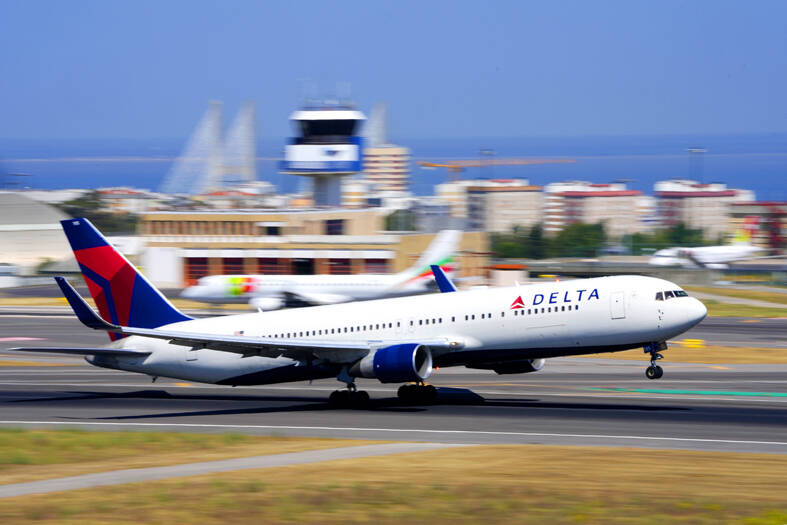After years of stumbles and weak results, Boeing Co on Wednesday said it expects to return to operational health and a more robust financial performance by the middle of this decade.
The aerospace giant — which has reported losses for the past three years — guided investors to 2025 or 2026 as when they should expect a financial performance resembling those the company posted prior to issues with the 737 MAX and the COVID-19 pandemic.
Investors cheered the outlook, sending shares up more than 7 percent at one point as Boeing signaled a more normal level of production and plane deliveries within the foreseeable future. Shares finished 2.8 percent higher at US$147.41.

Photo: AP
“We are on the right path to return to the operational and financial strength we expect of ourselves,” Boeing chief executive officer Dave Calhoun said at the outset of the company’s first investors’ day since 2016.
Boeing’s difficult period began in October 2018 with a deadly Lion Air crash of a 737 MAX, the first of two fatal crashes of the plane that together claimed nearly 350 lives and led to a global grounding of more than a year and a half.
The company’s problems mushroomed when the COVID-19 pandemic decimated global travel beginning in 2020.
Demand has recovered strongly and the 737 MAX has been cleared for service by most leading regulators.
However, Boeing has struggled to fully exploit the improving environment due in part to supply chain problems and heavier scrutiny from US air safety regulators. These issues have forced the company to curtail production and delayed the certification of new aircraft.
The forecast released on Wednesday includes a gradual improvement in Boeing plane deliveries and production next year and in 2024, and hitting its stride after that, boosting revenues.
Boeing executive vice president Stan Deal told analysts that he expects to liquidate most of a backlog of undelivered planes by 2024, with a few spilling into 2025. This includes 787 Dreamliner planes, in addition to 737 MAX aircraft.
Deal also updated the timeframe on the certification of the 737 MAX 10, its latest version of the plane, saying the aircraft should be cleared for service by late next year or early 2024.
The company projected free cash flow, a closely watched benchmark of financial health, rising to US$3 billion to U$5 billion next year from the U$1.5 billion to US$2 billion range this year.
It said free cash flow would surge to about US$10 billion in 2024 and 2026, much closer to the US$13.6 billion Boeing notched in 2018.

CHIP RACE: Three years of overbroad export controls drove foreign competitors to pursue their own AI chips, and ‘cost US taxpayers billions of dollars,’ Nvidia said China has figured out the US strategy for allowing it to buy Nvidia Corp’s H200s and is rejecting the artificial intelligence (AI) chip in favor of domestically developed semiconductors, White House AI adviser David Sacks said, citing news reports. US President Donald Trump on Monday said that he would allow shipments of Nvidia’s H200 chips to China, part of an administration effort backed by Sacks to challenge Chinese tech champions such as Huawei Technologies Co (華為) by bringing US competition to their home market. On Friday, Sacks signaled that he was uncertain about whether that approach would work. “They’re rejecting our chips,” Sacks

NATIONAL SECURITY: Intel’s testing of ACM tools despite US government control ‘highlights egregious gaps in US technology protection policies,’ a former official said Chipmaker Intel Corp has tested chipmaking tools this year from a toolmaker with deep roots in China and two overseas units that were targeted by US sanctions, according to two sources with direct knowledge of the matter. Intel, which fended off calls for its CEO’s resignation from US President Donald Trump in August over his alleged ties to China, got the tools from ACM Research Inc, a Fremont, California-based producer of chipmaking equipment. Two of ACM’s units, based in Shanghai and South Korea, were among a number of firms barred last year from receiving US technology over claims they have

BARRIERS: Gudeng’s chairman said it was unlikely that the US could replicate Taiwan’s science parks in Arizona, given its strict immigration policies and cultural differences Gudeng Precision Industrial Co (家登), which supplies wafer pods to the world’s major semiconductor firms, yesterday said it is in no rush to set up production in the US due to high costs. The company supplies its customers through a warehouse in Arizona jointly operated by TSS Holdings Ltd (德鑫控股), a joint holding of Gudeng and 17 Taiwanese firms in the semiconductor supply chain, including specialty plastic compounds producer Nytex Composites Co (耐特) and automated material handling system supplier Symtek Automation Asia Co (迅得). While the company has long been exploring the feasibility of setting up production in the US to address

OPTION: Uber said it could provide higher pay for batch trips, if incentives for batching is not removed entirely, as the latter would force it to pass on the costs to consumers Uber Technologies Inc yesterday warned that proposed restrictions on batching orders and minimum wages could prompt a NT$20 delivery fee increase in Taiwan, as lower efficiency would drive up costs. Uber CEO Dara Khosrowshahi made the remarks yesterday during his visit to Taiwan. He is on a multileg trip to the region, which includes stops in South Korea and Japan. His visit coincided the release last month of the Ministry of Labor’s draft bill on the delivery sector, which aims to safeguard delivery workers’ rights and improve their welfare. The ministry set the minimum pay for local food delivery drivers at